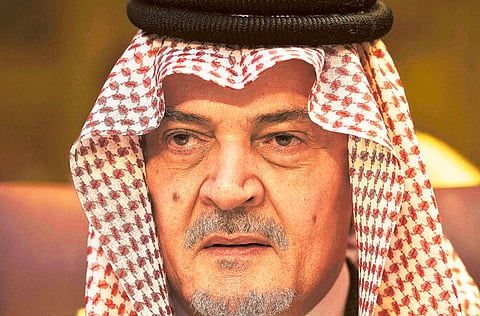Riyadh: no international mediation with Qatar
Dispute will not be resolved until Doha revises its policies, Saudi Arabia says

Manama: Saudi Arabia has ruled out the possibility of international mediation in its dispute with Qatar, and said that the conflict will not be resolved “until Qatar revises its policies”.
In the first official statement from the three countries that recalled their ambassadors from Doha protesting against what they say is Qatar’s interference in their affairs, Saudi Prince Saud Al Faisal told London-based Saudi daily Al Hayat that the trio will not budge from their positions on Qatar.
A political crisis between Bahrain, Saudi Arabia and the UAE and fellow Gulf Cooperation Council (GCC) member Qatar is looming large this week.
Manama, Riyadh and Abu Dhabi on March 5, in an unprecedented move since the establishment of the GCC in 1981, pulled out their ambassadors from Doha to protests against Qatar’s non-compliance with agreements approved by the GCC states.
Even though Doha did not reciprocate and did not withdraw its ambassadors, the situation remained tense amid speculations that it could even escalate.
Al Faisal added that plans for a Gulf union it has proposed remain on the table and have not been affected by the Gulf crisis.
The paper also reported that a number of Saudi officials have in the past two weeks skipped bilateral meetings with their Qatari counterparts that were scheduled to be held in Doha.
The three GCC states are angry at Qatar’s support for the Muslim Brotherhood, an Islamist movement.
They particularly resent the way Doha has sheltered prominent Brotherhood preacher Yousuf Al Qaradawi, a critic of Saudi and UAE authorities, and given him regular air time on its pan-Arab satellite channel Al Jazeera, and on Qatari state television.
“If Qatar, which caused the crisis readjusts its policy, there will be a breakthrough,” Prince Saud said in statements carried by Saudi-owned London-based Al Hayat and Asharq Al Awsat on Tuesday.
US President Barack Obama is said to be in Saudi Arabia at the end of this month.
Al Faisal made his statements amid reports that Saudi officials did not show up for bilateral meetings with their counterparts in the Qatari capital over the last two weeks.
If true, the Saudi decision to limit contacts with the Qataris would mark a new low in the relations between the two neighbouring countries as tension in the GCC thickens.
In Kuwait, sources told local Arabic daily Al Watan that a GCC meeting for coast guard officials scheduled to be held in Doha had been moved to Kuwait.
However, a foreign ministry official denied reports that the GCC countries had agreed to shift all the GCC institutions from Doha to Riyadh.
“The claims are mere speculations. The GCC foreign ministers have not met since they decided to recall the ambassadors, so how could they make a decision on the matter?” the sources that the daily did not name said.
Several Kuwaitis have insisted that Kuwait, the host of the Arab summit on March 25, could play a positive role in narrowing the gap between Bahrain, Saudi Arabia and the UAE on one side and Qatar on the other.
Last week, the local media reported that the Kuwaiti Emir Shaikh Sabah Al Ahmad Al Jaber Al Sabah received a letter from the Qatari Emir Shaikh Tamim Bin Hamad Al Thani on bilateral relations, issues of common interest and the latest regional and international developments.
Last week, Qatar dismissed demands by the three fellow Gulf states for changes to its foreign policy, calling its independence “non-negotiable”.
The GCC, formed in 1981 and also including Kuwait and Oman, has generally presented a united front at times of threat ranging from Iranian revolution on the other side of the Gulf to Iraq’s invasion of Kuwait.
With inputs from Reuters
Sign up for the Daily Briefing
Get the latest news and updates straight to your inbox


